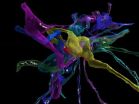(Press-News.org) A team of scientists has linked changes in the structure of a handful of central brain neurons to understanding how animals adjust to changing seasons. Its findings enhance our understanding of the mechanisms vital to the regulation of our circadian system, or internal clock.
The work, which appears in the journal Cell, focuses on the regulation of "neuronal plasticity"--changes in neuronal structure--and its function in the brain.
"Neuronal plasticity underpins learning and memory, but it is very challenging to tie changes in specific neurons to alterations in animal behavior," explains Justin Blau, the paper's senior author and a professor in NYU's Department of Biology and at NYU Abu Dhabi. "In our research, we've discovered how plasticity of a very small number of neurons helps run the biological clock and aids transitions to different seasons."
The paper's other authors were Afroditi Petsakou, a recent PhD graduate from NYU's Department of Biology, and Themistoklis Sapsis, an assistant professor at MIT.
In their study, the researchers focused on the principal s-LNv clock neurons in the fruit fly Drosophila, which is commonly used for research on circadian rhythms--earlier studies of "clock genes" in fruit flies lead to the identification of similarly functioning genes in humans.
Specifically, their work centered on the ends/tips of the axons of these neurons, where they release their signals. Previous research had established that these termini change their structure with a 24-hour rhythm, but it was unclear what function these alterations served.
In the Cell study, the scientists quantified the daily changes in s-LNv axon termini and found that they grow and retract every 24 hours. They also identified the protein that drives these rhythms in neuronal plasticity: Rho1. Moreover, they found that plasticity of the s-LNvs is required both for maintaining circadian rhythms (the biological clock) and for allowing seasonal adaptation of these rhythms. Specifically, if s-LNvs are unable to retract then flies behave normally in winter but fail to predict the early dawn of long summer days. Conversely, if s-LNvs remain in a retracted state, then flies behave as if they are in summer on both short and long days.
They also found rhythms in the proteins at the ends of the s-LNv axons. At dawn, s-LNvs have high levels of proteins involved in sending signals and low levels of the proteins that allow them to receive signals. The opposite is true at dusk. This unusual type of neuronal plasticity suggests that the function of s-LNvs changes dramatically over the day: from mainly sending signals at dawn to mainly receiving signals at dusk.
The findings may also shed new light on a human affliction, spinocerebellar ataxia--a neurodegenerative disease that affects coordination and movement. Blau's group found that the daily changes in Rho1 activity are controlled by rhythms in transcription of a gene very similar to human Puratrophin-1.
"Since some forms of spinocerebellar ataxia are associated with mutations in human Puratrophin-1, our data support the idea that defective neuronal plasticity underlies loss of motor control and leads to neurodegeneration," notes Blau.
INFORMATION:
The research was supported by grants from the National Institutes of Health (GM063911, NS077156 and C06 RR-15518-01).
Despite their remarkably similar appearance, the "golden jackals" of East Africa and Eurasia are actually two entirely different species. The discovery, based on DNA evidence and reported in the Cell Press journal Current Biology on July 30, increases the overall biodiversity of the Canidae--the group including dogs, wolves, foxes, and jackals--from 35 living species to 36.
"This represents the first discovery of a 'new' canid species in Africa in over 150 years," says Klaus-Peter Koepfli of the Smithsonian Conservation Biology Institute in Washington, DC.
The new study, ...
The desire to quit smoking--often considered a requirement for enrolling in treatment programs--is not always necessary to reduce cigarette cravings, argues a review of addiction research published July 30 in Trends in Cognitive Sciences. Early evidence suggests that exercises aimed at increasing self-control, such as mindfulness meditation, can decrease the unconscious influences that motivate a person to smoke.
Scientists are looking to the brain to understand why setting a "quit day" isn't a surefire way to rid oneself of a cigarette habit. Recent neuroimaging studies ...
A study that took a novel approach to investigating factors affecting the emergence of symptoms of Huntington's disease (HD) has identified at least two genome sites that house variants that can hasten or delay symptom onset. In their report in the July 30 issue of Cell, the multi-institutional research team describes how genome-wide association analysis of samples from more than 4,000 HD patients found that particular variants on two chromosomes were more common in individuals who first exhibited HD-associated movement disorders either earlier or later than would otherwise ...
Not every mom and dad agree on how their offspring should behave. But in genetics as in life, parenting is about knowing when your voice needs to be heard, and the best ways of doing so. Typically, compromise reigns, and one copy of each gene is inherited from each parent so that the two contribute equally to the traits who make us who we are. Occasionally, a mechanism called genomic imprinting, first described 30 years ago, allows just one parent to be heard by completely silencing the other.
Now, researchers at the University of Utah School of Medicine report on a ...
A new imaging tool developed by Boston scientists could do for the brain what the telescope did for space exploration. In the first demonstration of how the technology works, published July 30 in the journal Cell, the researchers look inside the brain of an adult mouse at a scale previously unachievable, generating images at a nanoscale resolution. The inventors' long-term goal is to make the resource available to the scientific community in the form of a national brain observatory.
"I'm a strong believer in bottom up-science, which is a way of saying that I would prefer ...
Oropharyngeal cancer patients who were found to have detectable traces of human papillomavirus type 16 (HPV16) in their saliva following cancer treatment are at an increased risk for recurrence, a study led by researchers at the Johns Hopkins Bloomberg School of Public Health has found.
The oropharynx is the area of the upper throat that includes the back of the tongue, the soft palate, the tonsils and the walls of the throat. Oropharyngeal cancer accounts for 2.8 percent of new cancers in the United States; it is often treated successfully with surgery.
In a small ...
In the last two decades, prosthetic limb technology has grown by leaps and bounds. Today, the most advanced prostheses incorporate microprocessors that work with onboard gyroscopes, accelerometers, and hydraulics to enable a person to walk with a normal gait. Such top-of-the-line prosthetics can cost more than $50,000.
Amos Winter is aiming to develop a passive, low-tech prosthetic knee that performs nearly as well as high-end prosthetics, at a fraction of the cost.
"We're going after this disruptive opportunity," says Winter, an assistant professor of mechanical ...
NEW YORK, July 30, 2015 - Major achievements have been made in the domestic HIV/AIDS response as a result of increased realignment and coordination of efforts at the federal level. However, that level of consistent coordination and alignment has yet to take place in most states. In an effort to identify what needs to be done, amfAR, The Foundation for AIDS Research, in collaboration with the National HIV/AIDS Initiative at the O'Neill Institute for National and Global Health Law at Georgetown Law, has released a set of recommendations for how states across the U.S. can ...
BUFFALO, N.Y. - A little recognition for a job well done means a lot to children with Attention Deficit/Hyperactivity Disorder (ADHD) - more so than it would for typically developing kids.
That praise, or other possible reward, improves the performance of children with ADHD on certain cognitive tasks, but until a recent study led by researchers from the University at Buffalo, it wasn't clear if that result was due to heightened motivation inspired by positive reinforcement or because those with ADHD simply had greater room for improvement at certain tasks relative to ...
The presence of persistent human papillomavirus (HPV) type 16 DNA in oral rinses after treatment for HPV-related oropharyngeal cancer was rare but it appears to be associated with poor prognosis and therefore may have potential as a long-term tool for tumor surveillance, according to an article published online by JAMA Oncology.
HPV infection is responsible for the majority of oropharyngeal carcinomas in the United States. In 10 percent to 25 percent of patients with HPV-positive tumors, the cancer will progress after treatment and earlier diagnoses of progressive or ...


